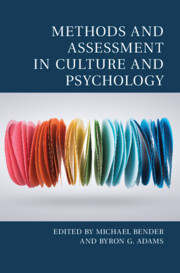Book contents
- Methods and Assessment in Culture and Psychology
- Culture and Psychology
- Methods and Assessment in Culture and Psychology
- Copyright page
- Dedication
- Additional material
- Contents
- Figures
- Tables
- Contributors
- Foreword
- 1 Introduction to Methods and Assessment in Culture and Psychology
- Part 1 Acculturation and Identity
- Part 2 Individual Differences across Cultures
- 6 Broadening the Bases of Methodological Rigor in Cross-Cultural Educational Assessment
- 7 Individuals, Groups, and Classrooms: Conceptual and Methodological Considerations on Studying Approaches to Cultural Diversity in Schools
- 8 Emotion between Universalism and Relativism: Finding a Standard for Comparison in Cross-Cultural Emotion Research
- 9 Culture Is More Than Self-Reported Motives, Beliefs, and Values: Methodological Advancements of Measuring Implicit Motives across Cultural Contexts
- 10 Development of the South African Personality Inventory: A Cross-Cultural Design in a Non-Western Society ‒ Lessons Learned and Generalizability to Other Parts of the World
- 11 Combining Global and Local Approaches in Psycholexical Studies: Glocal Illustrations from Studies on Arabic
- Part 3 Culture and Assessment
- Index
- References
9 - Culture Is More Than Self-Reported Motives, Beliefs, and Values: Methodological Advancements of Measuring Implicit Motives across Cultural Contexts
from Part 2 - Individual Differences across Cultures
Published online by Cambridge University Press: 21 January 2021
- Methods and Assessment in Culture and Psychology
- Culture and Psychology
- Methods and Assessment in Culture and Psychology
- Copyright page
- Dedication
- Additional material
- Contents
- Figures
- Tables
- Contributors
- Foreword
- 1 Introduction to Methods and Assessment in Culture and Psychology
- Part 1 Acculturation and Identity
- Part 2 Individual Differences across Cultures
- 6 Broadening the Bases of Methodological Rigor in Cross-Cultural Educational Assessment
- 7 Individuals, Groups, and Classrooms: Conceptual and Methodological Considerations on Studying Approaches to Cultural Diversity in Schools
- 8 Emotion between Universalism and Relativism: Finding a Standard for Comparison in Cross-Cultural Emotion Research
- 9 Culture Is More Than Self-Reported Motives, Beliefs, and Values: Methodological Advancements of Measuring Implicit Motives across Cultural Contexts
- 10 Development of the South African Personality Inventory: A Cross-Cultural Design in a Non-Western Society ‒ Lessons Learned and Generalizability to Other Parts of the World
- 11 Combining Global and Local Approaches in Psycholexical Studies: Glocal Illustrations from Studies on Arabic
- Part 3 Culture and Assessment
- Index
- References
Summary
Motivational psychology distinguishes between self-attributed or explicit motives that are part of people’s self-descriptions and implicit motives that are basically unconscious. Implicit motives are shaped first during ontogeny, have far-reaching consequences for feelings and behavior, and are measured by so-called Picture Story Exercises (PSE) in which participants express personal fantasies without any self-reference or restriction to actual life contexts. We will (a) give reasons why implicit measures have incremental value for cross-cultural investigations, (b) document methodological advances in implicit motive research, and (c) include an overview of current developments. We focus on findings documenting the significance of implicit motives for individuals’ behavior and psychological processes from evolutionary, developmental, and cross-cultural perspectives. We conclude that to improve our understanding and predictions of universal and culture-specific aspects of behavior by individuals’ motives within and across cultural groups, we need to supplement our reliance on self-report measures with implicit measures of motives.
Keywords
- Type
- Chapter
- Information
- Methods and Assessment in Culture and Psychology , pp. 170 - 197Publisher: Cambridge University PressPrint publication year: 2021
References
- 1
- Cited by

